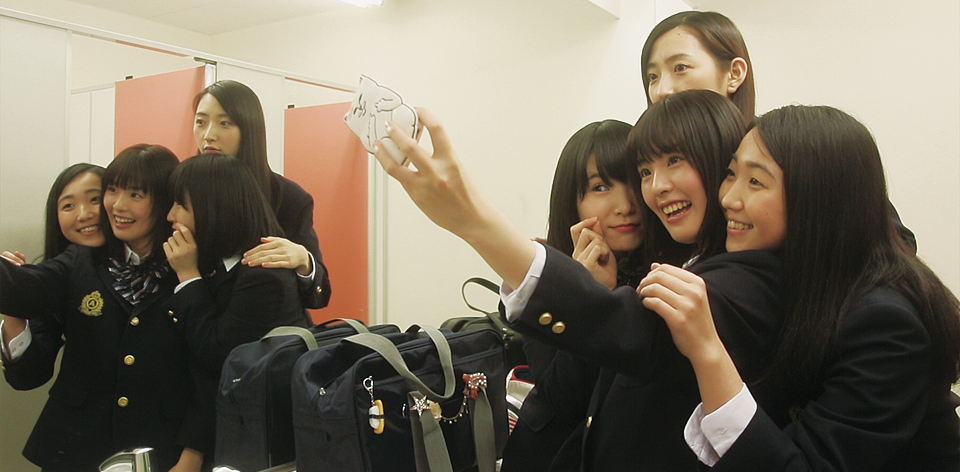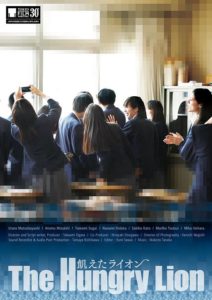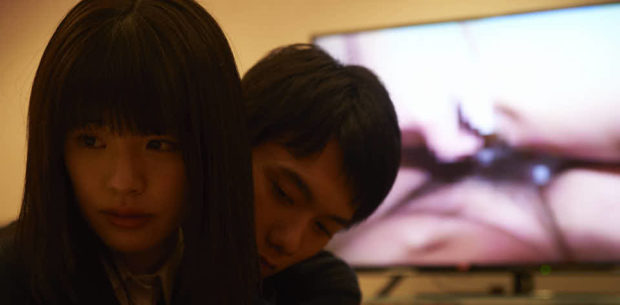If you’re reading this review, there’s a pretty good chance that you’ve been on the Internet lately. It’s a pretty wild place, and misinformation can spread like wildfire. It’s fertile territory for writer/director Ogata Takaomi to explore in THE HUNGRY LION (飢えたライオン), and a chance to expose many of the contradictions in Japan’s attitude to sex and the media.
Hitomi (Matsubayashi Urara) is a social media obsessed high school girl, especially when it comes to her boyfriend Hiroki (Atomu Mizuishi). Following the arrest of a high school teacher for an affair with a student, an explicit video is leaked onto the web. A false rumour spreads that Hitomi is the girl in question, and the online and offline abuse begins. Even support from her friends and family begins to diminish.
In an era where the purveyors of misinformation are also attempting to alter the term “fake news,” Ogata’s film couldn’t be more timely. His previous outings, Never Ending Blue (2009) and Sunk in the Womb (2013), explored self-harm and abuse, and it could be argued that social media is a form of both. Transcending the actual ‘locker room talk’ of high school girls, which is presented here in a naturalistic and frank manner, it’s a laser-focused study in how lies become truth in a meme culture.
Filmed with a series of convention-defying fixed shots, the no-frills camera rarely moves from a static position. Mostly glimpsing interactions from across the room or street, or occasionally from a handheld selfie, Ogata makes each moment observational. Neatly keeping actual acts of violence or assault off-camera, the viewer almost becomes complicit in the observation. Yet like social media, we have the excuse of anonymity as a means of dissolving any associated guilt.
Matsubayashi Urara has the difficult task of holding this narrative together. As the star of her own paparazzi, she treads the difficult line between mental disintegration and otherwise respectful teen. The actions of people around her become unconscionable, yet the muck continues to stick to her. Ogata fills the frames with contradictory messages for Japanese teens, everything from sexualised idol culture to commonplace porn. When she does finally break, it is a moment as naturalistic and casually bleak as any other.
If THE HUNGRY LION falters, then it is in a misplaced final act. A further tragedy gives the film a stylistic shift, and it is the media frenzy that becomes the focus of the tale. Positive stories about Hitomi turn sour in a heartbeat, before Ogata pulls back the curtain a bit a levels the accusatory lens directly at the audience. These final few moments are a bit on the nose, but while it doesn’t quite stick the landing, it’s a powerful discussion plainly told.
 2017 | Japan | DIR: Ogata Takaomi | WRITER: Ogata Takaomi, Fuki Ikeda | CAST: Urara Matsubayashi, Atomu Mizuishi, Mariko Tsutsui | DISTRIBUTOR: Geta Films/Spirits Project Inc., Sydney Film Festival (AUS) | RUNNING TIME: 77 minutes | RELEASE DATE: 9 June 2018 (SFF)
2017 | Japan | DIR: Ogata Takaomi | WRITER: Ogata Takaomi, Fuki Ikeda | CAST: Urara Matsubayashi, Atomu Mizuishi, Mariko Tsutsui | DISTRIBUTOR: Geta Films/Spirits Project Inc., Sydney Film Festival (AUS) | RUNNING TIME: 77 minutes | RELEASE DATE: 9 June 2018 (SFF)






